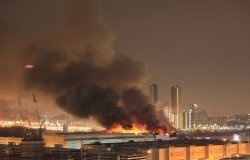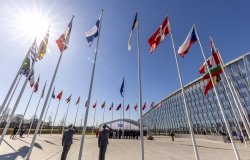Effects of the Economic Crisis on Eurasia
Russia, Ukraine, and Kazakhstan were among the Eurasian nations experiencing steady economic growth when the global financial crisis hit, shaking the region's economic, social, and political structures. Their leaders are still grappling with how to respond.
Since the global financial crisis began in 2008, the Kennan Institute has organized several lectures exploring the impact of the crisis on Eurasian countries. In the years leading up to the crisis, many of these nations, particularly Russia, Kazakhstan, and Ukraine, had experienced strong economic growth largely based on cheap international credit and high prices for the natural resources and commodities they exported.
When the economic crisis first hit the United States and other Western nations, many in Eurasia thought they would be immune, or "decoupled," from the effects of what appeared to be a Western housing bubble collapse. However, the crisis soon triggered a rapid decline in international prices for the commodities produced by these nations, from oil and gas to metals and chemicals, as well as a severe credit crunch. By late 2008, the Eurasian region found the global economic crisis had arrived at its door as well.
Russia
"In early August 2008, Russian financial reserves combined with the Sovereign Wealth Fund reached about $600 billion," said Charles Ryan, chairman of Deutsche Bank in Russia. By November 2008, when he spoke at the Wilson Center, the financial picture for Russia was much shakier.
During 2007-08, Russia had reached the height of its economic strength. It had amassed the third largest foreign currency reserves in the world. Foreign direct investment (FDI) during the first nine months of 2008 had already surpassed the total for 2007, and fixed investment growth was approximately 22 percent. "It was the first time Russia had fixed investment growth similar to that of an Asian tiger," Ryan observed.
In addition to the mounting global financial crisis, a series of mini-shocks rattled Russia during the summer of 2008, ranging from the war in Georgia to a public feud between BP and Russian shareholders of the multinational energy firm TNK-BP. Ryan said these shocks undermined the confidence of Russian as well as foreign investors.
Capital outflows grew and banks stopped lending money. Fixed investment growth plummeted, and the Russian government scrambled to protect Russia's banking system and prevent assets of overleveraged Russian businesses from falling to foreign creditors. As the crisis continued, the Russian government started burning through its foreign currency reserves in an attempt to manage the declining value of the ruble, and by spring 2009, Russia's reserves fell below $400 billion.
The crisis, and Russia's response, has affected more than Russia's economy. "The social dimension of Russia's response to the current economic crisis will define the future of Russia's political development," said Andrei Kortunov, president of the New Eurasia Foundation. At a seminar in February, Kortunov said the crisis only heightens existing contradictions in Russian society, such as income disparity and gaps in regional development. The Russian dream of owning a car, apartment, and dacha now seems out of reach to most Russians, and the ruble's devaluation has made imports and travel abroad more expensive.
Meanwhile, said Kortunov, the Russian consumer is shifting focus from consumption to salaries and jobs. Employment outside of Moscow is declining and one-company or industry towns are experiencing layoffs and plant shutdowns. Unemployment likely will hit 10 to 15 percent by the end of 2009, he predicted, and regions with metals or machine-building industries, as well as the North Caucasus, are most at risk.
All of these developments are straining Russia's state capacity at all levels. Regional governments are -struggling to meet infrastructure and social spending goals that local companies helped support in better times. And corruption is limiting the effectiveness of subsidies and other policy responses from the central government intended to help regions cope with the crisis.
Kortunov said Russia's future political development depends on the willingness of Kremlin leaders to adapt to current conditions by providing a new social contract to Russian citizens. This new contract would involve dismantling former President Putin's vertical power structure to address the low capacity of local leaders to meet constituent needs. The current crisis has exposed the weaknesses of the Putin system, Kortunov said, but those invested in the current system may find it difficult to undertake the necessary hard choices.
Ukraine
From 2003-07, Ukraine had one of the fastest growing economies in the region with booming domestic demand and strong exports. During the first eight months of 2008, real GDP grew 6.3 percent, the fiscal budget had a surplus, and foreign currency reserves reached $37 billion.
Despite this success, Ukraine proved more vulnerable than other emerging markets to the detrimental effects of the current global financial crisis, said Edilberto Segura, partner and chief economist at SigmaBleyzer in Kyiv, at an April lecture.
Once the global crisis hit in October 2008, he said, GDP contracted sharply. The crisis struck both pillars of Ukrainian growth—domestic demand and exports. In January and February 2009, industry and construction declined dramatically. Ukraine's exports fell by 38 percent during this period as world prices for its principal products, metals and chemicals, went into steep decline.
Segura identified three factors that make Ukraine particularly vulnerable to the continuing crisis: its current account deficit; an external debt burden amounting to 60 percent of GDP; and a weak banking sector suffering from non-performing loans and deposit flight. Despite this, he said Ukraine still can contain the effects of the crisis if it implements certain economic measures, including macroeconomic stabilization, conservative fiscal policy, and efforts to boost exports. Even with the right policies, Ukraine's economic recovery will depend on securing long-term foreign financial assistance and the recovery of the world economy.
Central Asia
"Recent financial scandals and economic distress in the United States and Western Europe have demonstrated how deep the paradoxes of capitalism extend in the most advanced forms of free market capitalism" said Gul Berna Ozcan, a Wilson Center fellow, during a January lecture. She said previous advocates of the virtue of free markets and economic liberalism are now at the forefront of interventionist policies, which makes Western capitalism appear all the more perplexing for those in the post-Soviet region.
Ozcan has analyzed the 20-year experience of three Central Asian states—Kazakhstan, Kyrgyzstan, and Uzbekistan—with market-building and private enterprise development. She found that these efforts, which were guided by international organizations and foreign advisors, have resulted in oligarchic markets, consolidated authoritarian regimes, and a wary engagement with Western institutions.
Market reforms were proposed and implemented, she said, without regard to existing capacity in these countries and without any credible supporting international ties comparable to the EU's engagement with Eastern Europe. Although each of the three nations she studied approached economic reform differently, from shock therapy to an incremental approach, the result has been strikingly similar: privatization and deregulation under authoritarianism allowed presidential families, their associates, and select private groups to dominate the market.
As financial disruption continues to unfold in Western capitalism, Ozcan predicted new questions will emerge about Eurasia's economic development. State interventions will increase and oligarchic control of markets will deepen. Overall, a lack of enthusiasm toward Western prescriptions indicates the region likely will look to different models, such as China and Russia. Economically successful authoritarian regimes, such as Singapore's, also look attractive to the region's leaders. "Western democracy and market capitalism," she concluded, "are no longer aspirations."
Conclusion
The economic crisis struck the Eurasian region hard, derailing economic growth and damaging the political stability that was based on that growth. The nations navigating this crisis possess varied levels of economic development and natural resources, and are implementing diverse policy responses. But all of them have moved beyond the era of economic transition, when foreign advisors and organizations helped shape economic and domestic policy. Instead, the leadership of each nation is seeking new models for how to engage the global economy while maintaining political stability at home. How quickly the world economies recover, and how other developed economies engage these nations, will do more to shape the political economies of the region than any technical advice ever could.
Related Program

Kennan Institute
The Kennan Institute is the premier US center for advanced research on Russia and Eurasia and the oldest and largest regional program at the Woodrow Wilson International Center for Scholars. The Kennan Institute is committed to improving American understanding of Russia, Ukraine, Central Asia, the Caucasus, and the surrounding region though research and exchange. Read more










